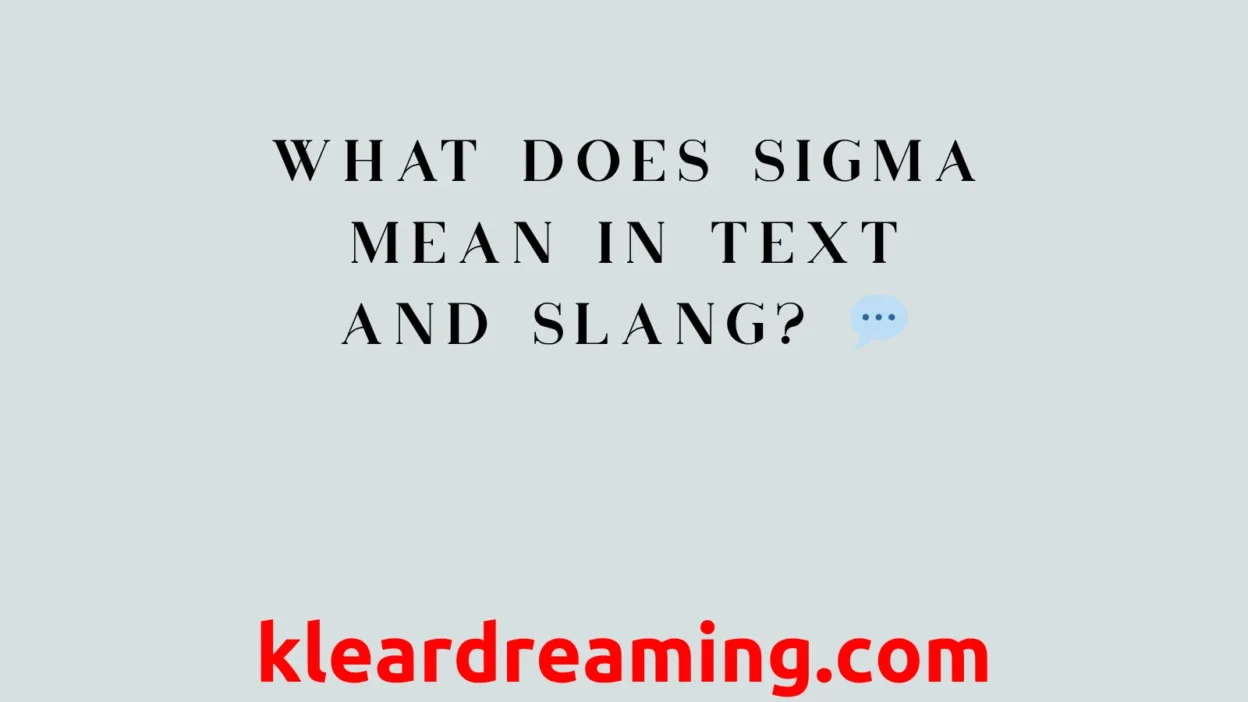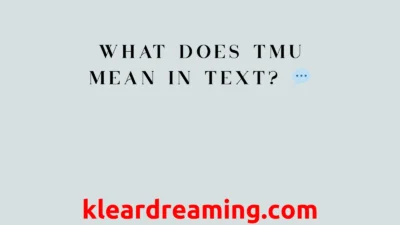The first time I saw someone comment “that’s real sigma energy” under a TikTok, I stared at my screen for a full minute trying to decode what they meant. Was it a compliment? A joke? A personality type? If you’ve ever felt confused when someone casually drops sigma in a message or caption, you’re not alone. The slang came out of nowhere and suddenly everyone was using it. It’s the kind of term that looks mysterious but shows up everywhere — in memes, reels, DMs, and gaming chats.
Quick Answer: Sigma means “sigma (short for sigma male)” — a casual, meme-inspired slang used to describe someone who’s independent, confident, low-key, and doesn’t try to fit into social hierarchies. Think lone wolf energy.
What Does Sigma Mean in Text?
At its core, sigma is a slang term derived from the idea of a “sigma male.” While the original concept began in internet communities discussing personality archetypes, the way it’s used today is much more relaxed, humorous, and meme-driven.
Simple Definition
When someone calls a person “sigma,” they’re usually describing someone who:
- Handles things alone
- Seems confident without showing off
- Doesn’t follow the crowd
- Has calm, silent charisma
- Prefers independence over popularity
- Acts unfazed or mysterious
It’s basically shorthand for:
“They do their own thing — and it somehow looks cool.”
People use sigma to highlight this quiet, self-reliant vibe. It can be used seriously, but more often, it’s used jokingly or playfully.
Example Sentence
“he walked out of the party without saying goodbye — sigma behavior fr.”
Bold Summary Line
In short: Sigma = Sigma male = independent, confident, low-key ‘lone wolf’ energy.
Where Is Sigma Commonly Used?
Because sigma is a modern slang word, it spreads best in spaces where short, punchy, meme-like language thrives. Here’s exactly where you’ll see it most:
📱 TikTok
People use sigma constantly in meme edits, aesthetic videos, “aura” reels, and personality breakdowns. Many creators post “Sigma POV” clips or list “signs you’re sigma.”
On reels and posts, sigma shows up in captions, meme pages, or comments hyping someone up for being effortlessly cool or mysterious.
🐦 Twitter / X
Short, witty posts often use sigma to describe celebrities, fictional characters, or real-life behaviors that seem quietly dominant or unbothered.
💬 Snapchat & Texting
Friends send it jokingly:
“u really just dipped w/o telling anyone… sigma 😂”
🎮 Discord & Gaming Chats
Gamers use it to describe calm, high-skill players or someone who clutches a match without talking much.
Communities debating personality types or mocking them both love using sigma in ironic or serious ways.
Is Sigma Formal or Casual?
- Super casual
- Social-media slang only
- Absolutely not appropriate for business messages, emails, or academic writing
- Best used with friends or online communities that understand meme language
Sigma is a word you drop in group chats or comments — not on a résumé or a professional DM.
Examples of Sigma in Conversation
Below are 7 realistic chat examples written in authentic texting style — short, lowercase, natural, and emoji-friendly:
Example 1
A: “bro left the party without saying anything”
B: “real sigma stuff 😂”
Example 2
A: “he just works, gym, home. that’s it.”
B: “sigma routine ngl”
Example 3
A: “why he so quiet but everyone respects him??”
B: “sigma energy 😌”
Example 4
A: “she handled everything by herself”
B: “low-key sigma queen tbh”
Example 5
A: “i think he’s ignoring me lol”
B: “nah he’s prob just in his sigma mode 😭”
Example 6
A: “aced the test and acted like it was nothing”
B: “that’s peak sigma behavior”
Example 7
A: “my man just walked in, grabbed coffee, left”
B: “why is that kinda sigma tho 😭👌”
These examples show the casual, playful way people use sigma in daily conversations.
When to Use and When Not to Use Sigma
Like all slang, sigma only works in the right situations. Here’s your clear guide.
✅ When to Use “Sigma”
Use it when you want to describe:
- A friend who’s acting aloof or mysterious
- A character who’s cool, calm, and independent
- Someone doing something bold without bragging
- A meme moment that fits the lone-wolf vibe
- An inside joke about someone’s quiet confidence
- Content that’s trolling or humorous
- TikTok-style personality descriptions
Sigma works best when the mood is playful, friendly, or lightly admiring.
❌ When NOT to Use “Sigma”
Avoid using it in:
- Job applications, corporate messages, or business emails
- Serious or emotional conversations
- Discussions about mental health or isolation
- Academic work or professional writing
- Messages to someone who might misunderstand it
- Conversations where clarity is important
Even though it’s popular, it can come across as immature or confusing outside casual settings.
Comparison Table: When Sigma Works & When It Doesn’t
| Context | Example Phrase | Why It Works / Doesn’t |
|---|---|---|
| Friend Chat | “bro is so sigma today 😭💀” | Casual, humorous, fits slang culture |
| Group Chat | “that was a sigma comeback ngl” | Fun & playful with friends |
| Social Media | “sigma vibes only ✨” | Meme-friendly and trendy |
| Dating App | “quiet but confident = sigma?” | Light, flirty, not too serious |
| Work Chat | “he’s a very independent worker” | Clear and professional (no slang) |
| Formal Email | “Please review this when possible.” | Sigma would sound unprofessional |
| School Assignment | ✘ “He has sigma energy” | Too slang-heavy for academic tone |
Similar Slang Words or Alternatives
Here’s a helpful table comparing sigma with other related slang terms:
| Slang | Meaning | When to Use |
|---|---|---|
| Alpha | Confident leader, dominant personality | When describing outgoing, assertive behavior |
| Beta | Quiet, follower-type (often insulting) | Avoid unless joking with someone close |
| Omega | Outsider, doesn’t care about hierarchy | Meme situations or playful ironies |
| Lone Wolf | Someone who prefers solitude | More serious or descriptive writing |
| Rizz | Charisma, flirting skill | Dating & playful conversations |
| Chad | Stereotypically confident and attractive male | Meme culture, playful exaggerations |
Sigma falls between “lone wolf” and “alpha,” but with a more mysterious, quiet edge.
FAQs About Sigma
1. Is “sigma” a compliment?
Usually yes. Most people use it to hype someone up, admire their confidence, or tease them for being quietly cool. But it can also be used sarcastically.
2. Is “sigma” only for men?
No. Even though the idea started as “sigma male,” people now use sigma for anyone — men, women, or even fictional characters — who give independent, calm, self-reliant energy.
3. Is sigma an actual personality type?
Not scientifically. It’s more of a meme-based archetype than a psychological category. It’s fun and trendy but not officially recognized in psychology.
4. Why do people post “sigma edits”?
These edits highlight characters or people who act cool, calm, and mysterious — often to exaggerate the sigma vibe for humor or aesthetic effect.
5. Is sigma the same as introvert?
Not exactly. Introversion is about quietness and energy levels. Sigma focuses more on independence, confidence, and acting outside social hierarchies.
6. Can sigma be used for jokes?
Absolutely. Most people use sigma jokingly or ironically:
“me ignoring homework = sigma 🤡”
7. Should I call myself sigma?
You can — but it sometimes sounds like trying too hard. It’s much better when someone else jokingly calls you sigma.
Deep-Dive Meaning of Sigma
To truly understand why sigma became so popular, it helps to look at how internet culture loves categorizing behavior with simple labels. Instead of giving long explanations about personality, people prefer quick memes that paint a whole vibe in one word. Sigma became one of those words because it combines mystery, confidence, and independence in a way that’s easy to meme.
A “sigma” character often:
- Succeeds without bragging
- Works in silence
- Observes more than they speak
- Avoids unnecessary drama
- Doesn’t need social validation
- Makes decisions independently
- Appears self-sufficient
- Keeps personal life private
This is why so many movie and anime characters get labeled “sigma.” They have that iconic, calm, unbothered presence.
Psychology Behind Why Sigma Became Trendy
Even though sigma is not a real psychological term, people gravitate toward it because:
1. It represents freedom from social pressure
In a world full of expectations, being “sigma” feels like breaking free from the need to impress others.
2. It signals quiet strength
Not loud, aggressive confidence — but the kind that’s subtle and controlled.
3. It’s relatable for introverts
Many introverts feel seen when people use sigma to describe being calm, independent, or reflective.
4. It’s easy to meme
Anything that’s mysterious or aloof can instantly be labeled “sigma,” which makes the term perfect for comedic exaggeration.
5. It blends sarcasm and admiration
You can praise someone or gently tease them using the same word — which makes it flexible and fun.
Cultural Influence of Sigma
Sigma entered mainstream slang because of:
- Movie characters (John Wick, Batman, Levi Ackerman)
- Anime edits on TikTok
- Aesthetic slow-motion reels that highlight calm behaviors
- Gaming personalities who play silently but skillfully
- Memes comparing “alpha vs sigma”
- Personality quizzes shared online
The concept snowballed until people started using sigma even without referencing masculinity or social hierarchy.
Today, it’s simply a vibe — a way of describing someone who’s effortlessly cool and independent.
How to Use Sigma in Your Own Conversations
Here are ways to include sigma naturally in chats:
For friends:
“u didn’t even argue bro, just left. sigma 😂”
For jokes:
“me doing the bare minimum = sigma 😭”
For hyping someone:
“ok calm king, very sigma of u 😎”
For self-irony:
“i’m not antisocial, i’m sigma coded.”
Final Reflection
When someone asks “Sigma meaning in text?” they’re really trying to understand this simple but surprisingly layered slang. Sigma isn’t a scientific term — it’s a fun, modern, meme-style label for someone who feels confident, independent, and mysterious. It works perfectly in group chats, TikTok captions, and casual messages, but not in any formal or serious context.
Use it lightly, playfully, and with the right people — and you’ll sound perfectly in tune with today’s internet culture.



